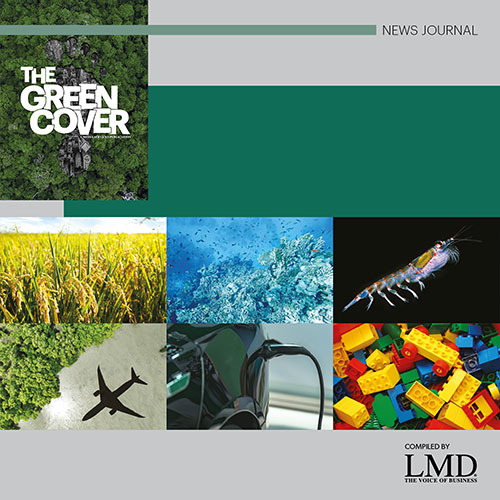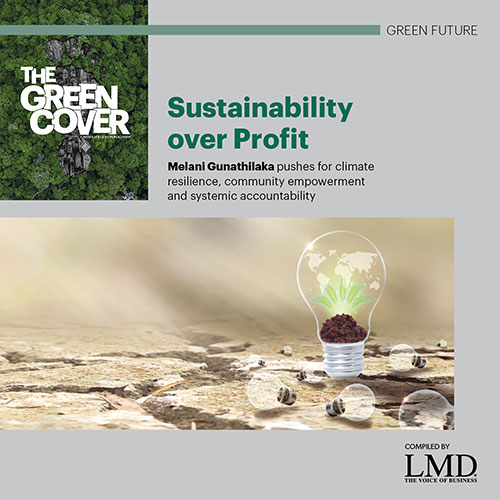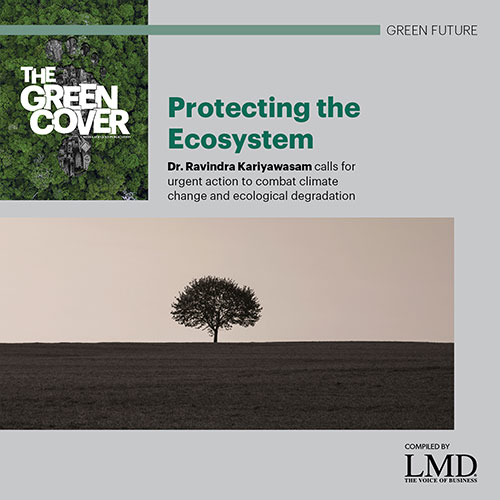SUSTAINABLE TECHNOLOGY
Investing in Sustainability
Heminda Jayaweera highlights the role of sustainable innovation and green tech in Sri Lanka’s future

Alongstanding innovator and former Chief Operating Officer of the Sri Lanka Institute of Nanotechnology (SLINTEC), Heminda Jayaweera expresses hope that Sri Lanka is still able to upscale its SME sector through greater sustainable innovation and the use of green tech.
He cites the example of Samsung as it was in the late 1960s and early ’70s: a large department store in South Korea but little-known abroad, which eventually transformed itself into a high-tech global brand.
“The Samsung story could be applicable to Sri Lanka,” Jayaweera mentions, stressing: “In fact, when there is a crisis such as a pandemic, it could be considered the best time to engage in product enhancement.”
Elaborating on this perspective, he says: “As Sri Lankans, we are not very good risk takers. We need ideas and cohesion, to bring in experts and researchers to look at innovation in high-tech products from traditional industries.”
For example, he notes that “large apparel companies here are expanding their innovative products” while acknowledging that “SMEs are not in the high-tech sphere.”
 In Jayaweera’s view, Sri Lanka can also follow the example of Israel, which has gained recognition for technology and industrial manufacturing being its major economic segments. Small-scale green tech entrepreneurs and startup founders in the country have enjoyed support, and a comprehensive venture capital industry was formed.
In Jayaweera’s view, Sri Lanka can also follow the example of Israel, which has gained recognition for technology and industrial manufacturing being its major economic segments. Small-scale green tech entrepreneurs and startup founders in the country have enjoyed support, and a comprehensive venture capital industry was formed.
The country’s education structure was revamped and Israel established a high-tech startup ecosystem, encompassing solutions from agri-tech to cybersecurity. Eventually, it came to be a nation of startups – one that produces high-tech startups with a focus on markets in developed regions from Europe to the US.
Recounting Sri Lanka’s success with green tech, Jayaweera cites Thuru – a startup with the goal of accelerating the reforestation process by using technology through which more than 50,000 trees have been planted. The app was recognised among the top five mobile innovations for climate change at the MWC (Mobile World Congress) Barcelona 2020.
Another example of green tech in the local context is Zerotrash, which strives to promote a sustainable model to recycle plastic trash. This initiative has led to the organisation’s first 10 ton trash collection centre in Boralesgamuwa being set up.
Jayaweera is the co-founder of both these sustainability initiatives.
According to him, the financial services industry too should play a key role in technology diffusion and startup growth. Sizeable investments are needed for these efforts – especially in the seed phase.
“Value addition should become a mantra for the SME sector if Sri Lanka is to move into global markets,” Jayaweera maintains, pointing out that “Sri Lanka is the only country that grows true cinnamon and we have complete control over the raw material; all we need to do is pursue value addition and export.”
In addition to this, a unique form of graphite – i.e. vein graphite – is thought to be available only in Sri Lanka. This is now being converted into high value added graphene with the aim of gaining a competitive advantage on the international stage.
“At present, the level of technology infusion in Sri Lanka’s agricultural sector is next to nothing,” Jayaweera observes although he notes that “this is one area where high technology solutions can add great value.”
In his concluding remarks, Jayaweera emphasises that “as a country, we should move into precision agriculture where we can improve the sector’s quantity and quality without harming natural resources.”





